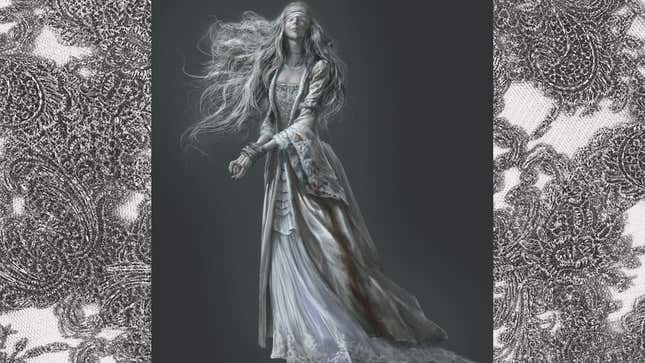
She’s watching me, I think. Her eyes, like her wrists, are obscured by gauze wraps, but I pickpocketed a corpse while exploring Bloodborne’s ruthless, forsaken Cainhurst Castle, and now she’s floating toward me.
She’s unhappy. I can tell from the way blood spurts from her neck like rain from a storm cloud. I’ve been an impolite visitor. So I let her scream for a second before I unfurl my trick weapon and end her—goodbye to another one of developer FromSoftware’s most impressive enemies, the Bound Widow.
Every time I replay action role-playing game Bloodborne, the gothic triumph of 2015, I need a few minutes to stare at its Bound Widows. These enemies are perfect to me, though they’re less obvious favorites than the scourge beasts that break my bones after I start a new game, or the spidery amygdala, their faces holey, pitted olives, that I find stuck on buildings like black mold.
The Bound Widows are exclusive to optional, challenging area Cainhurst Castle, so, to be with them, I need to put in the work. I do, though, on every playthrough. I perform the multistep ritual (which I won’t spoil for you here) to access their hidden area, and it’s like finding Dracula’s lair in a mirage; dangerous and fated.
Despite my leanings toward romanticism, I usually tear through most of the Castle while spinning my crude Hunter Axe, killing everything in sight, and wishing I could take the Widows’ deflated, tarnished gold Rococo gowns for myself. But I hear their sniffly crying echoing around me. When one melts off her invisibility to threaten me with the silver dagger that stretches from her tied hands, and another shows me her decapitated head, shrieking where it rests in her palms...I think I see myself, for a second.
I only ever feel truly scared while playing a horror game because of this feeling, the sense that I’ve identified myself in a river of preprogrammed blood, trickling from some undead woman haunting people as aggressively as she herself is haunted.
I understand these women. I have good reason: in her 1980 book Powers of Horror, Bulgarian-French philosopher Julia Kristeva writes that patriarchy forces “the feminine” to become “synonymous with a radical evil that is to be suppressed.” FromSoftware’s Bound Widows, unmistakably soft in their dresses and snow-colored hair, bleeding from their necks and useless hands, are products of this radical evil. In the game, I’m forced to take them down. In life, I know I’m one of them.
Buy Bloodborne: Amazon | Best Buy | GameStop
That’s why, no matter how many times I play Bloodborne, I try to find and admire them. If I didn’t, I’d feel indicted by surrealist poet Rimbaud when he writes, “How little you care about the wretched women, and the machinations and my embarrassment.” “When I am the girl who can tie your hands—then I will stifle you.” It’s easier for me, as a woman, to cry when we’re together.